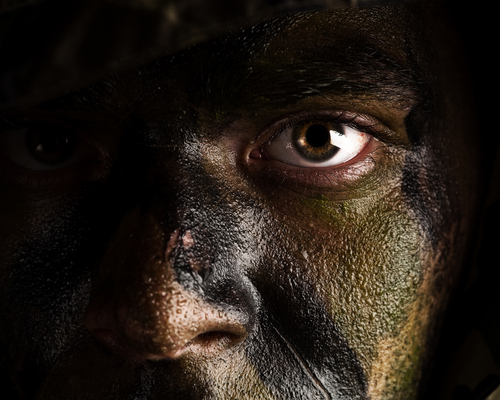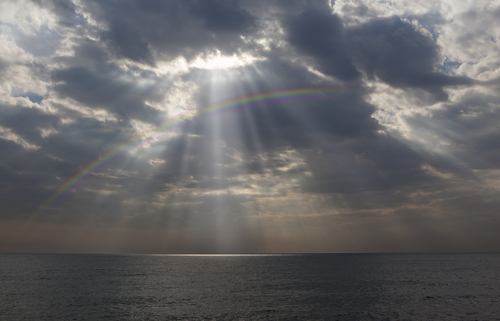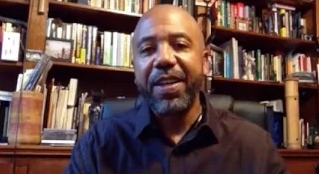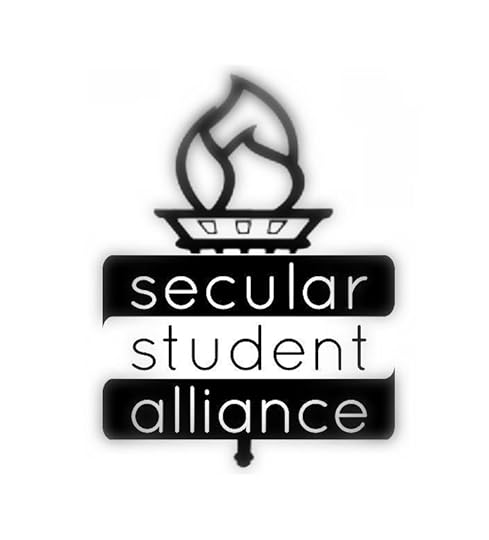Hemant Mehta's Blog, page 1900
October 17, 2014
A Reworking of Paul Harvey’s “If I Were the Devil”
This is a guest post written by Race Hochdorf.
[Note: Among the many things conservative radio broadcaster Paul Harvey was known for was his essay "If I were the Devil," versions of which you can see here. This piece is a rebuttal to Harvey's essay.]
…
If I were the Creator, I would think back upon the rebellion that got out of hand. That moment when dissent spread across the heavenly land. I would remember, and cringe at the memory, of my most trusted henchman becoming my enemy. He was the most angelic, my favorite, the most high, yet one day stopped and asked “Why?” He wondered why all power and all authority should be concentrated in a single being — that was me — rather than power being shared among all beings in heaven equally. In the first ever battle between democracy and dictatorship, I triumphed, and mercilessly cast out the rebel and all those who followed his leadership.
If I were the Creator, remembering this, I would create more followers to fill the new void, who would know not the tactics that I employed. I would do it in six days, indeed I would, and upon doing so, would tell the man and woman how much I was good. But then boredom would strike, so how could I resist, planting a tree and then telling man and woman “In all other things you’re free.” And then when the rebel once more appears, to tell man and woman about freedom from fear, and persuades them to join in rebellion against me, I will strike man and woman with agony. Affliction that brings upon them such misery they wish they’d never eaten from that tree, that tree that I planted with ornery glee. It was all a part of the plan, don’t you see — play a trick that allows the rebel to be my unwitting pawn, so that my new subjects could know fully my supremacy, before I declare “From paradise on earth, get gone!” They would blame the rebel in their dismay, and tell their children and their children’s children that the rebel is their enemy, always causing disarray.
If I were the Creator, let us fast forward, to a time when a Jew raised in Egypt began following my orders. The rebel staying silent turns out to be quite dull, so out of boredom once more, I become violent and make heads roll. I give the Jew from Egypt and his followers this rule and that. So many rules in fact, that it is impossible to perfectly keep them all, as was my intention, so that upon my punishing them for not doing so, in their desperate pleas to be spared, my name they mention, and at the end of their punishments, they believe that I cared. Thus far, my propaganda has worked — they praise me, the dictator, while blaming their ills on their liberator, who in the beginning, on the tree, lurked.
If I were the Creator, after seeing much blood in a desert spilt, I think I would allow some hope to be built. After enduring centuries of my cruelty, I would make the people so desperate I surmise, that from amongst them multiple delusional do-gooders who claim to be me, would arise. Some will be executed, others will die in battle, ah, but who’s this? One stands out from the rabble. He is smart in that against the Romans he makes no fuss, but I will still use him to get his people’s hopes up, and then let him, like the others go bust. He’s fasting in the wilderness for 40 days, I’m impressed, and who is this?! The rebel, making an appearance at last! But I’m not stressed. He appears to be talking to this “son” of mine, about settling for more earthly goals instead of attempting to be divine. The rebel is trying to ruin my fun, but it seems he is being rejected by my “son”, who spouts my propaganda that others wrote down, to drive away the rebel so he can continue dreaming about his crown.
If I were the Creator, fast forward once more, this “son” of mine has been killed and the method was far from a bore. Those Romans are brutal, but not as brutal as me, they have a lot to learn, but there’s some problems I see. No, not the fact that the followers of my Egyptian Jew are now few, and replaced by other worshippers of me, whose religion is new, that is not an issue. As long as my power is unquestioned, I’m flexible you see, I only require, in more ways than one, people’s lives as a fee. No the problem is that, while the Romans are brutal, they are not nearly as brutal as empires of the past, and this is crucial. They and the Greeks, it would seem, have this idea of civilization that makes their eyes beam. Lo and behold, as this notion of civilization unfolds, what I feared most has returned, the idea of democracy is now being told, a concept that in the rebellion I thought I had burned. Indeed, the Romans and the Greeks are very far from a democracy yet, but I still must destroy them before the idea gets set.
If I were the Creator, a few centuries later, I would be joyous that Rome swallowed Greece and then was destroyed itself by invaders. “Bring in the Dark Ages!” I would implore, “Let my dominion over the world be greater than ever before and let sadism in my name soar!” The English, the French, the Germans all, do not doubt my being the master, but in fact with gall, claim to serve me and kill each other faster. Nobody can read, nobody can write, many villagers fear the night. Children are made to bear sword in battle after the deaths of their fathers, while their mothers are raped and burned by my minions– who are cloaked monsters. But just when I think all is well, something occurs that becomes my personal hell.
If I were the Creator, dread I would, the Enlightenment that, from the terror of the Dark Ages, stood. Paine, Jefferson, Voltaire, and Hume are writers and thinkers at which I fume. They doubt the magic tricks performed by “my son,” they say the era of superstition is done. Democracy is brought back to life, and my henchman, my propagandists, are facing much strife. As if things could not get any worse, I thought, this bastard named William Blake told the truth about the rebellion in heaven fought.
But if I were the Creator, I would say “No matter.” After all, if one is to be the best of dictators, they should be able to handle more than one batter. All I would have to do is wait the Enlightenment out — let the monarchies and even the priesthood fall, I can survive them all, while the people shout. I will remain silent while this Enlightenment is ablaze, because all fires eventually turn to embers anyways. Let the writers, the philosophers and the thinkers die out, and once they do, again I’ll come out.
I am the Creator and this is what I did, I let a couple of centuries pass, and then the Enlightenment I undid. This is the time you live in now, where a relatively new strand of “my son’s” religion, to me now bows. The evangelicals, what a bunch! They base so much of their lives on a hunch. It would make me laugh, if it wasn’t so sad, how many people follow me fanatically and are being had. These evangelicals, dimwits all, wish to force everyone to be enthralled. They school themselves and live in a bubble, until they reach adulthood and then they make trouble. They rewrite history, saying “The Enlightenment thinkers were Christians! It is no mystery!” Further, they tell a young girl who doesn’t want to be a mother, that to terminate a zygote is murder. They tell this poor young girl, I, the dictator, am watching her from up above; they even give a shove to others who simply want to love who they love.
(Image via Shutterstock)
This Christian Will Eat a Page From the Bible If You Know One Qualified Professor Who Denies the Historical Jesus
Did Jesus really exist?
John Dickson, the founding director of the Center for Public Christianity in Sydney, is a little incredulous that anyone, especially qualified academic sources, could doubt that Christ was a real person. He doesn’t consider Richard Carrier‘s book (On the Historicity of Jesus: Why We Might Have Reason for Doubt) very convincing, nor does he appear to be impressed by Carriers’s credentials — PhD and MA degrees in ancient history from Berkeley and Columbia.
“Almost no one believes Carrier – outside the circle of eager sceptics.”
… claims Dickson.
“There is, of course, a spectrum in ‘historical Jesus’ studies, from hyper-sceptical to hyper-credulous (you see a similar spectrum in climate change discussions). Carrier is way down one end, and Christian apologists are at the other.”
I’m no expert. I’ve learned just enough over the years to think that there’s a good chance that Jesus was a real person (but not, surely, a product of the divine); and that there’s also a fairly good chance that he is largely or wholly a figment of later generations’ feverish longing for an otherworldly sorcerer or savior.
Anyway, Dickson has issued an interesting challenge:
I will eat a page of my Bible if someone can find me just one full Professor of Ancient History, Classics, or New Testament in an accredited university somewhere in the world (there are thousands of names to choose from) who thinks Jesus never lived.
Is the record as settled and as monolithic Dickson thinks? If not, and there’s even a single professor in this academic field who has serious doubts about Jesus’ flesh-and-blood existence, it’d be fun to literally watch Dickson eat his (OK, God’s) words.
Let us know in the comments.
(Image via Shutterstock)
Patrick Henry College President Resigns Following Pushback from School’s Mishandling of Sexual Assault Cases
Back in February, Kiera Feldman wrote an incredible story in New Republic about the sexual assault problems at Patrick Henry College, a fundamentalist Christian school known for sending a disproportionate number of graduates into political fields. Feldman wrote that reports of sexual abuse were not taken seriously even after female students came forward with their stories.
Researchers estimate that one in five American women is sexually assaulted in college, and Patrick Henry College’s unique campus culture has not insulated the school from sexual violence. In fact, it puts female students, like Claire Spear, in a particular bind: How do you report sexual assault at a place where authorities seem skeptical that such a thing even exists?
…
One winter night in 2010, John and Claire were together in his car in Purcellville. John claims that nothing inappropriate happened, but Claire says that, without warning, he climbed over the console between the driver’s seat and the passenger’s seat, mounted her, and began grinding against her. She froze, unable to speak. Afterward, Claire agonized over why she hadn’t “fought him” off. “I was afraid that it had something to do with my sinful nature,” she says. In the Christian world Claire had been brought up in, men only do bad things to impure women who have tempted them. She blamed herself, tried to act normal, and told no one.
Obviously, colleges across the country are trying to figure out the best way to handle these situations, making sure victims are taken seriously while the accused get due process, but the way Patrick Henry College handled the case seemed especially awful. It wasn’t just that school officials didn’t take the women seriously; they blamed them for bringing the assaults upon themselves by flirting, giving mixed signals, or wearing the wrong kinds of clothing. The perpetrators were given minor punishments, if that.
That’s why there’s some relief in hearing that the President of the school, Dr. Graham Walker, announced his resignation the other day, arguably due to pressure stemming from the school’s mishandling of sexual assault problems on campus.
Daniel Noa, President of the PHC Alumni Association, announced the resignation, leading R.L. Stollar of Homeschoolers Anonymous to write:
Noa notes that “there has been tremendous friction between the alumni community and Dr. Walker during the independent review process,” a reference to the alumni board established to review PHC’s handling of campus sexual assault allegations. Concerning Walker’s resignation, Noa also states that he sees it “as a positive change” and “a great step toward a bigger and more successful future for Patrick Henry College.”
For the sake of the students at the school, I hope new leadership, in whatever form it takes, leads to better procedures for dealing with these awful crimes. Whatever they’ve done so far hasn’t worked.
(Large portions of this post were published earlier)
The Bible is the Most Intimidating Chain Letter in History
Jeremiah Camara is a filmmaker working on a movie called Contradiction about how
African Americans, on average, are tithing approximately $250 million a week to their churches with very little to show in the way of cultural vitality, economic progress or any signs of real community prosperity.
It’s a fascinating topic and I can’t wait to watch the final product. In the meantime, Camara just made a brief video comparing the Bible to a long, powerful chain letter. It’s a powerful analogy:
Love that line near the end: “Nothing will happen if you break the chain.”
(Thanks to Larry for the link)
October 16, 2014
I’m Gonna Get That Devil… With Mah Prayers
Gotta love Key & Peele. Especially the uncensored versions of their sketches. This one’s completely NSFW:
(Thanks to Gaby for the link)
Even in the South, the Ten Commandments Are Treated Like Suggestions…
Alabama Media Group columnist John Archibald has an amusing article up about how people in the South claim to love their Bibles… but they’re pretty awful at following the Ten Commandments:
No. 5. Honor thy father and thy mother.
Ain’t nothing like mom and dad down South. Until you have to pay for them. All of the states across the deep South have refused to expand Medicaid, because people see it as a handout to poor mothers and their dad-gum kids. What they don’t see is that two-thirds of the Medicaid budget goes to struggling old folks and people with disabilities. Suck it mom and dad.
Fail.
They fail at the “no killing” and “no stealing” bits, too.
A lot of the commenters are furious that someone is pointing any of this out because Christians hypocrites? Never…
(Image via Shutterstock)
After School Newspaper Misrepresents Atheists, the Secular Students on Campus Finally Have Their Voices Heard
Earlier this year, the student newspaper at Ferris State University (in Michigan) published an opinion piece that featured this jab at atheists:
I’ve always found atheists to be a rather unfriendly lot of people, what with their unsolicited “science-based” tirades and my-way-or-the-highway attitudes towards the rest of the world.
However, when looking at the way their opposition usually behaves it’s not hard to understand the bitterness. Still, you’d think they’d want to be more welcoming considering they’re fighting a battle they can’t help but lose (and this writer hopes they do.)
It plays right into the already-nasty stereotypes about atheists and the writer never gives concrete examples of what he’s talking about. Hell, he makes it sound like religious people never think they’re right…
Anyway, what made the comments especially hurtful was that there’s a Secular Student Alliance group on campus and he never bothered to talk to them first.
So group leaders wrote a rebuttal to the piece… but they never received a response from the editors (they later found out it was rejected on a technicality). They wrote another version of the rebuttal, this time including passages about what the SSA group stood for and wanted to accomplish, but were told it was too long to publish.
Eventually, though, a reporter for the paper decided to attend a group’s meeting for herself — unrelated to the rebuttals. The resulting article turned out to show a much better side of atheists — an honest side:
The SSA isn’t an anti-religion group. Though most members are agnostic or atheist, they have had members with beliefs ranging from Paganism to Christianity.
“It’s a common misconception that we’re just here to bash Christianity,” SSA Vice President and Business Administration/Legal Studies junior Corinne Staten said. “That’s not what we’re about. It’s not about a war on religion.”
However, the SSA is about providing a sense of comfort to those who have struggled with their nonreligious opinions in a world flooded by religion.
“It’s very crippling the loneliness you sometimes get because you’re the only one who thinks that way,” SSA President and Engineering sophomore Steven Beckon said.
Wouldn’t you know it — when you actually hang out around atheists, those stereotypes fade away pretty quickly. Shocking…
I asked the group’s Vice President Corinne Staten what she took away from this whole experience and she told me that her group’s “perseverance and dedication” paid off because they were finally able to get their message across to the student body. Group President Steven Beckon also told me that the article was “not the one we intended but we think it was better than anything we could have [written].”
I agree. In fact, it was more effective because they never had to defend themselves. The reporter noticed what they’re really like in a much more objective way, and that message may ultimately be more powerful.
Alabama Columnist: This Whole School Prayer Thing Conservatives Want Could Backfire
Alabama lawmakers are proposing a bill that would allow public school officials to join prayers on school grounds that are student-initiated. It’s a form of coercion that takes things too far, since the teacher or administrators would effectively be endorsing religion through their actions. It’s not like they’re praying as private citizens, after all, but as government officials.
J. Pepper Bryars, a columnist from Alabama, knows that most citizens want this bill to become a reality, but he cautions them that this could all backfire… (ya think?!)
After all, even within Christianity, there are different prayers that promote different interpretations of the faith, and those aren’t just minor squabbles:
We have differences within the Christian community and some are serious enough to have divided nations, churches and even families. Simple questions about the doxology or a teacher’s remark during an expository prayer could fuel a discussion about the protestant reformation, justification, church authority, proper translations and countless other issues that should be left to parents and the churches they choose to attend. The last entity we need to involve in the matter is a government-run public school.
Public prayer and discussion by and with adults is fine. Reasonable people firm in their faith can tolerate our many differences in such forums, or at least they should. Having our children’s faith potentially incorrectly taught by a well-meaning teacher at their public school, however, may be a step too far.
Wow. A religious person from Alabama who gets it. Enjoy it, everyone. You don’t see this very often.
I would also add that there will be all sorts of chaos the moment a Muslim teacher joins in prayer with Muslim students, or a Satanist teacher does… whatever the hell they do. School officials should not be in the business of praying publicly at work. Not in the classroom or during a club meeting. It sends the wrong message, no matter who you are.
Then again, maybe it’s those non-Christians (or Christians who aren’t the “right kind” of Christians) who will finally convince people they really don’t want this bill to pass.
(Image via Shutterstock)
October 15, 2014
That’s One Reason the Harry Potter Series is Different from the Bible
There are plenty more reasons where that came from.
You can find this image and many others like it on the Friendly Atheist Facebook page!
African Factions of Muslims and Christians Commit Horrific Atrocities; Father Bernard Tries To Staunch the Violence
Appalling violence between Muslims and Christians is front and center in this New Yorker article from Jon Lee Anderson, who reports from Bossemptele in the Central African Republic (CAR). According to Anderson, the factions long lived together in relative peace, but in 2012 things began to go very wrong. A Muslim rebel group called the Seleka began an incursion into Christian areas, and the Christians in turn started their own armed group, the Antibalaka, which quickly went from a defensive civilian army to a genocidal organization hellbent on eliminating Muslims from the country of 4.5 million people.
The Seleka kept up their atrocities: burning people alive, killing hospital patients, throwing bound prisoners off bridges to drown. Peter Bouckaert, the emergencies director of Human Rights Watch, who spent months investigating the conflict, said, “Just think the four horsemen of the apocalypse and you’ll have the picture. People really hated them. That’s what got the Antibalaka going.” …
The [Antibalaka] fighters were emboldened by the belief, inspired by animist traditions, that they were protected by magic. They festooned themselves with wigs, costumes, and amulets to ward off attacks, and assembled an arsenal of bows with poison-tipped arrows, machetes, and a few hunting rifles. Dieudonné ["God-given," one of the founders of the Antibalaka movement] proudly recounted their exploits in early battles, seizing weapons and killing Seleka. When I pointed out that his men had killed entire families, he put on an obstinate look. “Yes, but the Seleka killed entire families,” he said. “They killed our people and left our parents to be eaten by dogs. We balanced things out. That’s vengeance, isn’t it?”
 Despite the intervention of French troops (CAR is a former French colony), the conflict continues to tear the country apart, one act of bone-chilling violence begetting another.
Despite the intervention of French troops (CAR is a former French colony), the conflict continues to tear the country apart, one act of bone-chilling violence begetting another.
Half a year ago,
At a reconciliation soccer game between young Muslims and Christians, Antibalaka gruesomely murdered three Muslim players. In retribution, armed Muslims attacked a church in a Christian neighborhood. Rumors spread that they decapitated the priest, jihadi style.
Tit for tat. On and on it goes.
The hero of Anderson’s piece is a priest, Father Bernard Kinvi, who helps run the Catholic mission in Bossemptele, and who is also in charge of the town’s hospital. He shelters and treats victims from both sides (at one point, more than a thousand Muslim refugees lived under his protection). Kinvi learned to advocate successfully for those who were on the verge of being killed by the opposing faction, saving countless lives.
“It’s not that we made a specific decision to help the Muslims,” Bernard explained. “It’s that our mission is to protect the weakest and most vulnerable.”
The Antibalaka have tried to take advantage of his caring and kindness.
Many of the Muslims who had been left behind were elderly or crippled by polio. They were easy targets. “The Antibalaka made a little business out it,” Father Bernard said, disgustedly. “They would call me and say, ‘Father, we have four …,’ and then ask for money for them. And so then we would go and get them. The prices depended on who they had.”
Nonetheless, the aggressors hold a grudging respect for him.
Bernard realized that his mission retained a special status, even for the Antibalaka. As the killers went from house to house, a kind of unspoken game began to play out: if Father Bernard made it past their guards, they would allow him to take wounded victims back to his mission. Bernard recalled carrying a disabled teen-age girl on his back. “As the Antibalaka saw me struggling to carry her, they laughed, because I was sweating and struggling so much,” he said.
Some days, all he can do is tend to the dead.
The bodies that had been left around Bossemptele began decomposing in the heat. “Nobody wanted to touch them, because in this country there is a superstition that if you touch a dead body you will die in the same way,” Bernard said. Together with a local Red Cross worker, he took the mission’s pushcart [the mission's four cars had been stolen by Muslim fighters] and went out to pick up the bodies. Some had been partly eaten by pigs. “The first day, we got twenty-one,” he recalled. “We took the bodies to the cemetery, but the people who came to help us began to vanish. There was nobody willing to help dig graves.”
Then Father Bernard remembered a place where there was a big hole in the ground, and he and his priests took the bodies there for burial. “It was not very dignified, but it was the only solution,” he explained. Father Bernard spent fifteen days retrieving bodies and burying them.
This, in fairness, is the other side of what (some) Catholics do, the side that usually – not always – gets short shrift on this blog. My hat’s off to Father Bernard, and others like him, times ten. Based on what Anderson tells us about him, he is one helluva brave and standup guy — a real Mensch.
At the same time, let’s not lose sight of the fact that ethnic differences, exacerbated by superstition and fueled by religion, make this kind of work necessary in the first place.
(Image via Shutterstock)
Hemant Mehta's Blog
- Hemant Mehta's profile
- 38 followers












